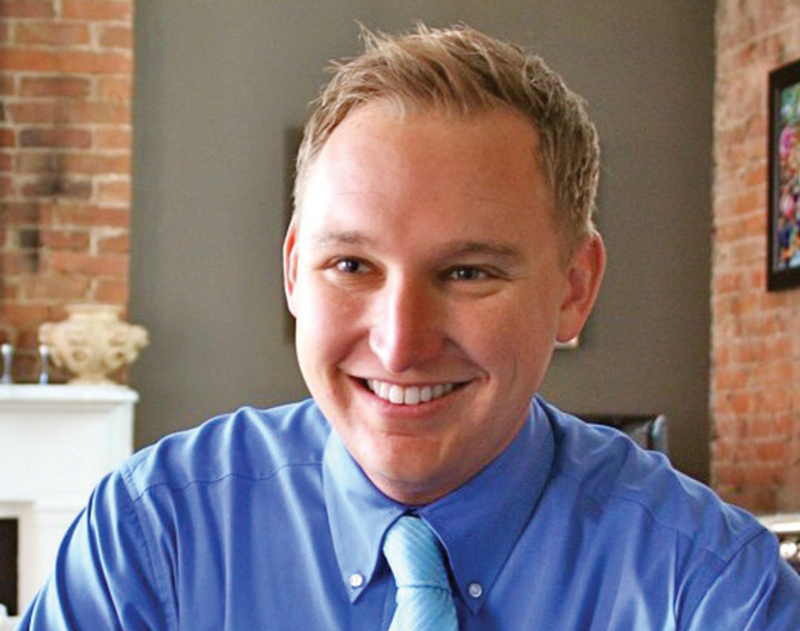Editor’s Note: This is the second in a series of profiles on the four new members elected to Cincinnati City Council.
The phrase, "Cincinnati’s first openly gay council member" has been regularly linked to Chris Seelbach’s name in media reports ever since his November election. In an interview last week, Seelbach told CityBeat that this label helped him win his seat on council and is an integral part of his identity as a man and a city leader, but it’s far from a complete picture of who he is.
It’s been just eight weeks since Seelbach was sworn in and he’s already kept a campaign promise to move Cincinnati toward allowing domestic partner benefits for city employees. Seelbach garnered the support of eight members of council — the lone Republican, Charlie Winburn was the only dissenter — to research how city health insurance could be extended to domestic partners, gay and straight, and says he hopes to have a final resolution passed this spring.
Seelbach is also moving forward to explore how Cincinnati could implement a needle exchange program to curb the spread of disease among local drug addicts.
“It’s important that people who are going to use, regardless, are not sharing needles with others,” Seelbach says.
And then there’s the Evanston Keystone Project. It’s now a patch of undeveloped land next to the Red Cross building at the Dana Avenue/Montgomery Road exit on Interstate-71.
“There’s plans for two more business complexes and one hotel,” Seelbach says. “Because of the economy and some issues with the plan since it was proposed, there have been some road blocks keeping the city from helping finance the next phase of this project, which is the hotel, which would have a restaurant, a bar and, quite frankly, would be really good for Evanston. There’s been so much development in Over-the-Rhine and downtown, which is great, but it’s also important that we invest our economic dollars in other parts of the city. I’ve been working very closely with Cecil Thomas and our interim economic development director, our city manager and the Neyer Group, which is who’s behind this, to find a way to leverage the money needed to help build this hotel.”
City officials are in the early stages of developing an ex-offender reentry program, designed to be the final phase of criminal rehabilitation — moving an ex-offender upon his or her release from the jail into a role as a productive member of the local economy. Discussions about how to best do this are ongoing between City Council and local pastors.
“Pastors, particularly African-American pastors, have come to me, saying, ‘We heard you talking about this and we want to help.’ So we’re making sure everyone is part of this conversation, including county leaders,” Seelbach says.
Seelbach’s dedication to social justice issues may have been inspired by his experiences as a gay man, particularly that of an out gay man in the professional world, but it’s not limited to that. Seelbach is a common face in Over-the-Rhine — he and his partner have made the neighborhood their home because they’ve seen that its potential outweighs its problems.
“Going on eight years, before 3CDC and after the riots, I’ve seen total transformation of the neighborhood and lived there with my partner and our four cats,” Seelbach says. “That’s where I want to be. That’s where I live most of my life. I fell in love with it immediately.”
Seelbach’s favorite recent book is Over-the-Rhine: When Beer Was King. Besides the connection to his beloved urban core, the book is very much about local German-Americans, which is core to Seelbach’s identity. Had he been born a century ago, he probably would have been organizing for the rights of Cincinnati’s German-American population.
Former Vice Mayor and longtime City Councilman David Crowley, who passed away just more than a year ago, was Seelbach’s friend, mentor and remains an example to Seelbach of what a public servant should be.
“There’s not just one building in Over-the-Rhine that inspires me,” Seelbach says. “It’s the neighborhood, the incredible architecture and the energy that’s just inspiring to be in. And the same thing with David; he championed everything from the environment to gay rights but he was so much bigger that that. He was inspiring. Who he was was inspiring. So I would hope that, in some way, I could be that to someone else.”
In fact, it was Crowley’s support and tutelage that moved Seelbach into politics: “That’s the only reason I ran for City Council. That’s what inspired me to run.” ©


